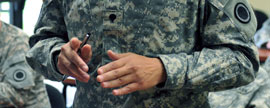UPDATED POST: The New AR 600-9 came out in June 2013. It specifically addresses calibrating scales: Here is what is says:Requires weight scale calibration annually (para B-2b).
Great question. To the best of my knowledge there is no such requirement.
Unfortunately the only information AR 600-9 provides about a scale is:
AR 600-9 B-2b:The weight will be measured with the Soldier in a standard PT uniform (gym shorts and T-shirt). Shoes will not be worn. The measurement will be made on scales available in units and recorded to the nearest pound with the following guidelines: (1) If the weight fraction of the Soldier is less than 1⁄2 pound, round down to the nearest pound. (2) If the weight fraction of the Soldier is 1⁄2 pound or greater, round up to the next whole pound.
While most active units have the standard balancing scales, there are times when these scales are not present. Therefore it is extremely important that any scale you use be calibrated. Some scales will work fine at say the 50- 100 range and then vary in tolerance as weight increases.
While deployed I ran into a similar problem. I did have a standard Army scale but I was unsure of the calibration and did not want to flag Soldiers without assuring myself that the equipment was operating properly. I commend you on taking the additional step of ensuring the equipment is functioning correctly and ensuring your Soldiers are properly taken care of.
The best method I have found is to use the following steps:
- Use a Standard Army scale if available and check the calibration.
- Otherwise, use a digital scale. Typically they tend to be more reliable.
- If possible, place a series of calibrated weights on the scale and see if the scale registers properly. You can find these calibrated weights within a TMDE shop or any other shop that evaluates measurements. Keep in mind there is no official requirement to calibrate a scale to my knowledge.
- Once you have verified the scale is correct, do not move it from its location.
- Prepare a memorandum of record documenting your actions and discuss your actions with the commander prior to conducting a weigh in. This ensures that if your scale is challenged you did everything within your means to ensure Soldiers were treated fairly.
For an official opinion, I would encourage you to contact the Army Physical Fitness School. They can be reached at
Physical Readiness Division Training Support and Schools Directorate ATTN: AFCG-MTT-PFS R2103 Warehouse Row Fort Jackson, S.C. 29207 Phone: 803-751-0964 DSN: 734-0964I reviewed TC 3-22.20 and found no information in the manual regarding scales or calibration.













Comments
Stuart O'Black
It is also important to note exceeding the weight standard for your height has no impact unless you fail the tape test that is required. So the only negative impact of the scale being off is that you may have to tape more or less Soldiers. If they are overweight according to the tape test regardless of the scale then they will be flagged and enrolled in the Army Weight Control Program(AWCP) . They scale being off could have a bearing on the monthly weight loss required to be successful which is not a lot. Also, remember meeting the height weight standard does not remove you from the AWCP only passing the tape removes you from the program.
Mark Gerecht
Stuart,
Great point! Thanks for bringing this up
antwan
That is not absolutely true. It is VERY possible to be under your allowed weight and still fail the tape test. All scales are suppose to be calibrated just prior to conducting a height and weight test.
Mark Gerecht
Antwan,
First thanks for sharing the information. Greatly appreciate your assistance.
Please provide a reference for your comment. As I read AR 600-9, AR 350-1, TC 3.22.20 none of these require a calibrated scale by regulation or guidance. Now I am in an agreement that a calibrated scale should be used but a command cannot be legally held to such action unless you have a TB/TC/TM/ETC for a scale that requires calibration. Based on my understanding and discussion with calibration specialist their is absolutely no (current) requirement to calibrate a scale. The Army of the lat 1980’s and early 1990’s did require a calibrated scale.
Now with regard to being under weight and still failing a TAPE test that is possible but usually not probable. Typically a Soldier is only taped when they exceed their HT/WT limit. The exception to this is Soldier you are weighed based on an overweight appearance.
If you see my response as not correct please provide a reference so I can become current on any changes.
Thanks much
TOP
Stuart
Thanks, Also in reference to ANTWAN statement yes you can be under the screening weight and still fail tape. However, the only reason to tape a person under the prescribed weight is if you go by the clause. AR 600-9 para 3-2 “When the unit commander or supervisor determines that the individual’s appearance suggests that body fat is
excessive.” which would make the scale not matter if the Soldier failed the tape test regardless of their weight. Then they still would have to be enrolled and lose the prescribed BF%. Best to do your best to have a proper scale and remove the barracks lawyers.